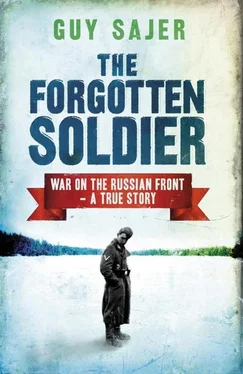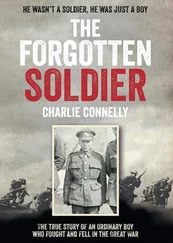Swaying on our unsteady legs, we stared at the vast flood of human misery slowly washing toward the safety which had been promised. In spite of the most prodigious efforts it was clear that these people could not receive even a tenth of what they were expecting. If their prayers had been heard, heaven would have opened to succor their misery. But nothing happened, and misery subsided only for moments at a time, as on the tear-streaked face of a child who has collapsed into a passing sleep.
As winter closed in, the thermometer sank toward five degrees below zero, only aggravating the plight of the refugees and accelerating the death rate.
A crowd stretched as far as the eye could see, in front of a large building crammed with people. From the building a faint smell of the gruel cooking in large caldrons washed over the tightly compressed mass of people, who stood stamping their feet to keep from freezing. The thudding of their feet against the pavement sounded like a dull roll of muffled drums. The children were the most heart-wringing. Many were lost. When they tired of calling for their mothers, they collapsed into floods of tears which nothing and no one could console. These were the smallest ones, too young to grasp any explanations. Their faces, dabbed with tears which instantly froze, remain one of the most pathetic images of that time. We tried to gather them inside, near the caldrons, where they might feel some of the heat. We questioned them, hoping for some identifying information we could broadcast over loudspeakers, but they could only reply with tears and sobs.
Further on, a large metal cross, which stood on a slight elevation, glittered with frost. It looked like a huge sword, thrust into the breast of catastrophe. Another part of the crowd had collected here to listen to the prayers and encouragement of a priest.
The cold grew so intense that the Frisches Haff froze, creating new difficulties for the boats still coming into Pillau. The Frisches Haff froze, and despite the desperate consequences of such cold the fact was put to use. Hundreds of thousands, on forced marches across the ice, were able to reach the narrow strip of land at Nehrung, and Kahlberg, and finally, Danzig. People also left from the pocket at Heiligenbeil. They experienced every sort of hardship, including attacks from Soviet fighter-bombers, which tried to break the ice with strings of bombs, and often succeeded. Private cars and other vehicles of every kind frequently disappeared into crevasses covered over by thin films of ice.
However, nothing could hold back the flood of refugees, who were prepared to endure the most severe hardships. As the Russians grew increasingly active throughout the sector, large numbers of people left Pillau by this providential route. Russian planes were flying over Pillau every day, and it appeared that the defense of Königsberg had given way.
As the work at Pillau had become less intense, we planned to evacuate everyone who wasn’t strictly essential. It was barely twelve miles from Königsberg to Pillau. The front at Cranz had also been shortened, and before long we too would probably be directly involved in the fighting. We were part of an inadequate reserve composed principally of fragments of broken or annihilated units, from which a certain standard of performance was still expected. No one knew any longer where the rest of the Gross Deutschland might be, but we still wore our divisional flashes on our worn and discolored tunics, and there were still a few familiar names near me — principally, Lieutenant Wollers, with a dirty dressing on his right hand, which had lost two fingers; Pferham, our disillusioned pastor; Schlesser; Lindberg, who had survived his fear; and our cook, Grandsk, who had long ago exchanged his caldrons for an F.M.
There were also my friend Hals, whom I will never be able to forget, and I, who have consecrated the rest of my life to bearing witness. Then there were seven or eight others, whose names I never knew, who, with us, made up what was left of the Gross Deutschland Division in that area. Had our division been scratched off the list? Not yet, it seemed. An officer hailed us and ordered us to attention. Our eyes, which had already seen so much, studied this gray-faced hauptmann, who still clung to his sense of disciplinary strength.
This discipline, which had so often annoyed us in the past, touched us now like a soothing balm. Its demands were those made of living beings, of creatures still worthy of life. We analyzed no further than that; for us, accustomed as we were to thinking only of the moment, this realization was a kind of dividend. The captain spoke to us, and through his firm, official voice we caught the intense emotion of the crushing load which weighed on all of us: officers and troops, men, women, and children. The time of boasting and gratuitous bullying was so far behind us that no attitude incompatible with the gravity of the circumstances was possible. A man was speaking to us as men; no one could evade the situation.
However, this man still wore the vestiges of a military uniform, and was still trying to impose some semblance of order in a situation of cataclysm which had swept an entire nation into a devastating retreat. This man, who knew that everything was lost, was still trying to save the moment. He told us that we would have to withdraw; that we too would have to cross the ice of the Frisches Haff, and get to Danzig, where several sizable fragments of our division still remained. He tried to tell us, in a tone which was not peremptory, that there was still work for us to do as part of a particular organization which could be found where he had indicated. He was not trying to spare us a worse disaster when he gave us those orders; the worst was everywhere, and there was no escape. The hauptmann was already walking toward another group of men, saluting as he withdrew.
So we started to walk. A violent wind swept the snow from the mirror like expanse of ice. In the distance we could hear the gentle purr of the sea, behind us, the steady roar of war.
In the evening, we reached the Frische Nehrung, and the first anti-aircraft bunkers, which barely rose above the long grasses, bent over beneath their burden of snow. To crown my personal difficulties, I fell and injured my foot. It was forty miles across the Nehrung. I would have to make it anyway. For a long time now, I had known that fate was against me.
I found a broken broomstick to use as a crutch. So many people had suffered and died in this place that my minor discomfort seemed almost indecently trivial. We progressed very slowly. The hollow of a battered, overturned boat sheltered us for a few hours. We were not the only ones to use it; a group of shivering civilians were already inside, groaning as they tried to sleep. I buried my head against Hals’s shoulder, hoping to pass out, despite our wretchedness.
We reached Kahlberg toward the middle of the next day. The small town was overflowing with starving refugees. People with the faces of madmen were wolfing down the flour which was the only food distributed to them. Cans of condensed milk were reserved for the children. Soldiers also had to stand in interminable lines, to receive, finally, two handfuls of flour apiece, and a cup of hot water infused with a minute portion of tea.
Our exhausting march resumed amid the pitiable swarms of faltering refugees. Twice we were attacked by Soviet planes, swooping low and scattering missiles which had been designed to destroy tanks. Each impact tore long, bloody furrows in the dense mass, and for a moment the wind was tinged with the warm smell of disemboweled bodies. Above all, I feared for the children, who could no longer understand anything about their situation. They didn’t know that the planes were enemy aircraft, or how urgently they were faced with cold and hunger. Everything was a misery for them, and each step a trap. The sky could make them suffer, and the earth hurt them. Their hands and feet made them bite their lips with pain. They were lost in a state of constant fear, which was justified by a world of horror which never let them forget their pitiable weakness. They stared about them with unseeing eyes at their swollen hands, which they wished were no longer attached to their bodies; at the people around them, who should no longer exist; and at the frozen grasses trembling in the wind, which they would never again enjoy as part of an innocent game.
Читать дальше












